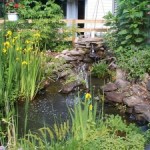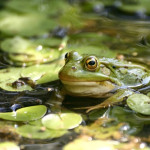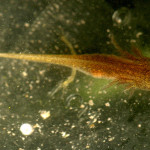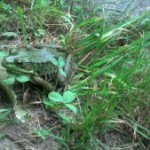Frogs lead double lives. They begin their lives as fish-like tadpoles, breathing with gills as they swim underwater, then metamorphose into their adult form, hopping onto land and breathing with lungs. As adult frogs, they have strong ties to water and most need to remain near water to keep their bodies moist.
So what does this have to do with you? In the past twenty years, habitat loss has been one of the main reasons for the decline in frog populations in the US. The housing boom, in particular, destroyed large areas of natural habitat for wildlife.
It is possible to help out your neighborhood amphibians by creating a frog pond in your backyard. As I am not particularly handy with home projects, I searched the web trying to find an explanation of how to do this that didn’t seem impossible. The best directions I found were on the Loudoun (VA) Wildlife Conservancy site. Although I’m not planning to dig a frog pond in my city backyard, I could imagine following these directions and making this type of pond if I had a large backyard in a more rural area.
Some key points:
- Be patient. If you build it, the frogs will come…ie, don’t stock the pond with pet store frogs or remove frogs from the wild and relocate them to your pond–that could make matters worse. Non-native species can wreak havoc on local ecosystems. Even native frogs could carry diseases that could cause death in local wild frogs. Just create a good environment for frogs and eventually they might appear.
- The pond should have sloped sides so that the froglets can emerge from the pond when they are are ready.
- Plant native plants and include lily pads etc (there are lots of water gardening catalogs).
- Obviously if you have young children in the area, keep the pond fenced off to prevent accidents.
- Don’t stock the pond with fish–they’ll eat the tadpoles.

Photo by Laura Regnier (courtesy of www.savethefrogs.com)





We have a beautiful totally natural lily pond in our landscape, with a perfect window view from our dining room. I am in love with the frog that has appeared there. But worried about a garden snake who also recently appeared. Won’t the snake eat the frog? OR will the frog eat the baby snakes?
I love the frog but not so much the snake, in my backyard habitat. Are snake repelents natural, and will they harm the frogs? IT says on the web that replelents just get the snakes all confused unable to sense the proximity of prey, so they simply leave the area that is treated with repelent. I cannot enjoy my garden with snakes running around. But I want to be sure the repellents will do no harm to the frogs or the earth or even really the snakes. Anybody know about this?
I saw a gruesome image of a garden snake snacking on a very big frog on the internet.
Point No. 1 is so true — build it and they will come. I had my doubts but sure enough. A few weeks after installing a small rubber pond in Vermont, Mr. Frog showed up and then two.
Hi Louis, thanks for telling us about your frogs, please keep us posted.
Thanks for your comment, Louis. That’s wonderful you had success with your frog pond. If you get a chance, please let us know how you made this pond.
Mary Jo
Pingback: A Garden Pond Is Relaxing And Calming
Just wanted to say HI. I found your blog a few days ago on Technorati and have been reading it over the past few days.
Thanks for your comment! Glad to have a new reader of the blog!
Mary Jo
Thanks an eye to writing, I very much liked your newest post. I reckon you should despatch more many a time, you evidently father unaffected facility appropriate for blogging!
Thank you for your comment, doctorbiml! Much appreciated.
Mary Jo
thanks for the great information…
Thanks in the course of post. Nice to look upon such good ideas.
Pingback: Turn Your Backyard into a Wildlife Habitat « Frogs Are Green- A blog to raise awareness about the threats frogs face in the world's changing environment...
Great article. My kids want a frog pond!
Dear Molly,
If you build it, they will come. (and then send photos!)
Thanks for writing, Susan
Pingback: Teach Your Children Well (about nature): Father’s Day Thoughts « Frogs Are Green- A blog to raise awareness about the threats frogs face in the world's changing environment...
Pingback: Creating a wildlife-friendly backyard « Frogs Are Green- A blog to raise awareness about the threats frogs face in the world's changing environment...
Pingback: Bonjour Baby Australia - Blog [Teach Your Kids About Nature]